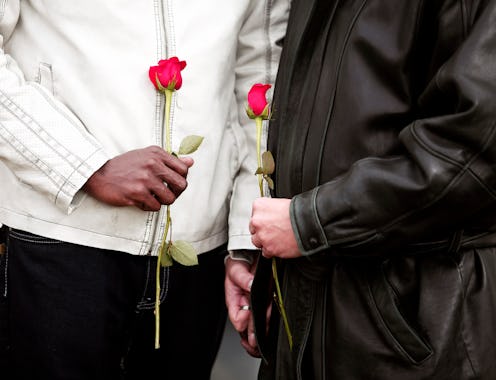News
Florida's Gay Marriage Ban Struck Down
The Sunshine State had its most definitive same-sex ruling to date on Thursday, when a Tallahassee federal judge found Florida's gay marriage ban unconstitutional. He's the fifth Florida judge to strike down the state's same-sex marriage ban in the last six weeks alone, but since he's the first federal judge to do so, his decision is the most far-reaching: It covers all 67 Florida counties. It's a big deal, but, like every other equality victory, it has to be taken with a spoonful of patience; the ruling has been stayed for the time being.
As it stands, 19 states in the U.S. allow same-sex marriage. That number is on the cusp of shooting up. Over the last month and a half alone, Florida's same-sex marriage ban has been struck down in the counties of Broward, Dade, Monroe and Palm Beach. Almost 57 percent of Floridians now support gay marriage. Across the U.S., 59 percent of voters are now in favor of the freedom to marry, according to a 2014 Washington Post/ABC News poll. Clearly, it's just a matter of time.
That is being increasingly reflected in the language used in gay marriage rulings. In spite of issuing an immediate stay pending appeals, U.S. District Judge Robert L. Hinkle used particularly strong — and hopeful — wording in defense of equality. In his 33-page ruling, he wrote:
When observers look back 50 years from now, the arguments supporting Florida’s ban on same-sex marriage, though just as sincerely held, will again seem an obvious pretext for discrimination. Observers who are not now of age will wonder just how those views could have been held ... To paraphrase a civil-rights leader from the age when interracial marriage was first struck down, the arc of history is long, but it bends toward justice.
His ruling also pointed out the holes in the my-state-my-marriage-laws argument, saying that "the defendants do not explain why, if a state’s laws on marriage are indeed entitled to such deference, the State of Florida is free to ignore the decisions of other equally sovereign states, including New York, Iowa, and Massachusetts."
Most poignantly, he emphasized how necessary the acceptance of same-sex marriage is for society:
Liberty, tolerance, and respect are not zero-sum concepts. Those who enter opposite-sex marriages are harmed not at all when others, including these plaintiffs, are given the liberty to choose their own life partners and are shown the respect that comes with formal marriage. Tolerating views with which one disagrees is a hallmark of civilized society.
Of course, some people — Florida Family Policy Council President John Stemberger, who drafted the state's constitutional amendment banning gay marriage, among them — disagree. "People ask me, are you on the wrong side of history? To me, this issue will never be on the wrong side of history because it’s rooted in the human experience . . . the beauty of how a man and woman come together and life is born and the next generation springs from that, that’s never going to be on the wrong side of history,” he told NorthEscambia.com on Thursday.
Regardless, Thursday's decision had another important (and touching) consequence: the death certificate of Carol Goldwasser, who died earlier this year, will be revised to include the name of her wife, Arlene.
